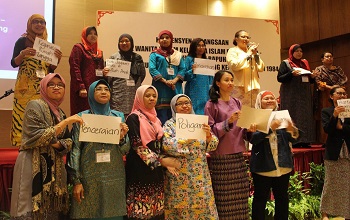Lesson Learned: The overall situation regarding women’s rights in Malaysia was largely unchanged by the project. However, if the project had not occurred, it is likely that the space to discuss Muslim women’s rights would have closed further as grantee activities kept these issues in the public arena. It also seems likely that this project provided a safe space for women to discuss their problems and to find strength in collective voice. The project also gave some of the women’s groups, pro-reform media and interested Members of Parliament (MPs) the language and justifications they could use to support Muslim Family Law reform when that issue arose.
 UNDEF/ Malaysia
UNDEF/ Malaysia